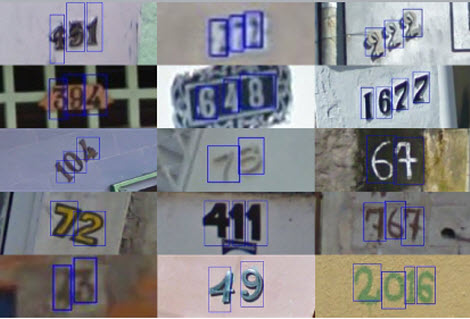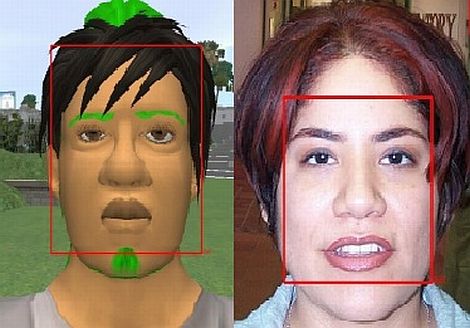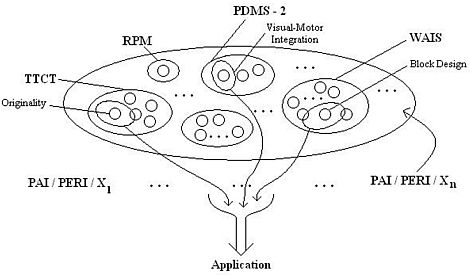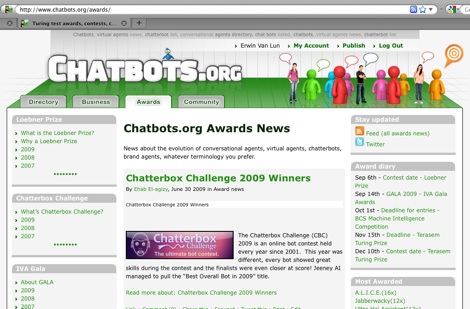
NEWS: Chatbots.org survey on 3000 US and UK consumers shows it is time for chatbot integration in customer service!read more..
Research News & Events
Virtual Human and uncooked chicken egg
 | by Karolina Kuligowska on Dec 8, 2011 in Research News |
Summary: Virtual Human grabs an uncooked chicken egg with its soft robotic gripper
Most conventional hard robots are composed of metallic structures. However, the development of soft robots can find new applications in robotics and virtual humans in augmented reality environment. An elastomeric gripper of an embodied agent equipped with an embedded pneumatic network could touch, recognize and gently pick up an egg!
The unintended Captcha Hack Algorithm of Google
 | by Erwin van Lun on Jan 2, 2012 in Agent's Processing, Cognition, Research News |
Summary: Google is working on algoritms to read house number from Google Street View images,unintendently cracking Captcha

In a paper called Reading Digits in Natural Images
with Unsupervised Feature Learning researchers from Google and Stanford University reveal a new method of identifying house numbers in Google Street View.
It’s just another attempt to add a bit of AI to Googles ability to understand the world.
As a result however, this algorithm is obviously very useful for Captcha hackers as well, as I’ve announced many times before. Captchas are those annoying characters you have to re-type when you leave a comment on a forum, to get access to certain information or when you register for a website, The purpose of Captchas are to separate computers from real human beings, assuming that humans are better in complex character recogntion than computers. This will soon be something of the past.
The result: computers will be able to create new accounts, register everywhere, spam everywhere. It will also retrieve password, access email boxes and send emails on behalf of real humans. It’s an unstoppable development. The only way to stop this: collaborate worldwide and define a new internet which is suitable for consumer usage. Also, we should get rid of the idea that we should protect privacy on the internet allowing people to stuff around anonymously without the chance of getting caught, and that everything should be available for free. Nothing is for free.
This will be part of a new concept for the future world, which I will refer to as
The Utopia Manifesto
Soon more!
Read more about: The unintended Captcha Hack Algorithm of Google
New salaried PhD position in real-time animation of virtual characters!
 | by Karolina Kuligowska on Mar 30, 2012 in Business, Jobs, Research News |
Summary: Phd position in Lab-STICC at European Center for Virtual Reality (CERV)
Artimetrics: biometrics for artificial conversational entities
 | by Karolina Kuligowska on Apr 18, 2012 in Agent's Appearance, Virtual worlds, Applications, Avatars, Research News |
Summary: Identity verification of embodied conversational agents, avatars, and virtual humans
 Dr. Roman V. Yampolski from University of Louisville claims that artificial conversational entities, shopping bots, and intelligent software applications became closer in their abilities and intelligence to human beings. Therefore arised the need to recognize and verify the identity of such entities just like it is necessary to authenticate the identity of people.
Dr. Roman V. Yampolski from University of Louisville claims that artificial conversational entities, shopping bots, and intelligent software applications became closer in their abilities and intelligence to human beings. Therefore arised the need to recognize and verify the identity of such entities just like it is necessary to authenticate the identity of people.
New, future oriented field of artimetrics, i.e. artificial biometrics, focuses on recognition, verification, and authentication of virtual agents, robots and other nonbiological entities. As a sub-field of cybersecurity, artimetrics is being developed in Cyber-Security Lab, which prides itself on being the world’s first to conduct this kind of research.
Read more about: Artimetrics: biometrics for artificial conversational entities
Dangerously self-aware chatbots should be kept in virtual prison!
 | by Karolina Kuligowska on Apr 23, 2012 in Agent's perception of humans, Facial coding, Agent's Processing, Action tendency, Learning, Cognition, Research News |
Summary: Virtual Prison for Hazardous Intelligent AI entities
Dr. Roman V. Yampolskiy from University of Louisville says that we should be aware of dangerously self-aware chatbots and he suggests to keep dangerous AI entities in virtual prison for avoiding social-engineering attacks. According to him, we should improve cybersecurity, because one day disobeying virtual agents could threaten humanity’s existence.
Read more about: Dangerously self-aware chatbots should be kept in virtual prison!
Measure your chat bot IQ!
 | by Karolina Kuligowska on May 18, 2012 in Agent's Processing, Creativity, Learning, Cognition, Research News |
Summary: Psychometric AI approach to measure computational intelligence

Psychologists nowadays are able to measure human intelligence by using various IQ tests. Nevertheless, they still don’t agree on one common definition of human intelligence. What would happen if we apply a similar approach to measuring intelligence of artificial entities, skipping never-ending discussions on AI definition? According to professor Selmer Bringsjord and Bettina Schimanski an answer is contained in Psychometric AI (PAI).
Nadine is a very human like robot
 | by Erwin van Lun on Jan 27, 2016 in Agent's Appearance, Humanoids, Research News |
Summary: Nadine, developed by scientist in Singapore, is a real virtual human, a human-like robot.
Scientists at the Nanyang Technological University, Singapore have unleashed their latest creation on the university’s campus: the world’s most human-like robot.
Nadine, as the robot is called, has soft skin and medium brunette hair just like her creator, Professor Nadia Thalmann. But more than her looks, the most impressive thing about Nadine is what she does: make eye contact, smile, meet and greet guests, shake hands, and even recognise past visitors and engage in conversation with them based on previous exchanges.
Unlike previous generations of robots, Nadine has an individual personality, with moods that change depending on the topic.
Awards for chatbots: Loebner, Chatterbox Challenge, Machine Intelligence, who knows more?
 | by Erwin van Lun on Jul 6, 2009 in Chatbots.org news, Chatbots.org News |
Summary: Awards for chatbots: Loebner, Chatterbox Challenge, Machine Intelligence, who knows more?

As you probably know, the Turing Test is a proposal for a test of a machine’s ability to demonstrate intelligence. The test celebrates its 100th birthday in 2012.
The most prestigious prize based on the Turing test, is obviously the Loebner Prize, started in 1990 by Hugh Loebner (who’s still passionate about chatbots).
The Loebner Prize however, is not the only prize in this area. There seem to be a few more prizes to win in the field of creating artificial intelligent and conversational life. For Chatbots.org we’re trying to create a list of all of them (and to list all the results on the site).
Chatbots.org 2.5: Awards, featured profiles and awesome design!
 | by Erwin van Lun on Aug 17, 2009 in Chatbots.org news, Chatbots.org News |
Summary: New Chatbots.org: all AI awards+feature profiles of individuals +brand new design, and fast!

Three months after release 2.0, we are very proud to present version 2.5 of Chatbots.org.
Version 2.5 features all chatbots and/ or related AI awards, a special ‘feature profiles’ section highlighting everyone who has willingly shared their AI knowledge and a brand new design of the Chatbots.org header, including animated favicon and cute Twitter animation. In addition, the speed of the website has considerably increased.
Read more about: Chatbots.org 2.5: Awards, featured profiles and awesome design!
AI4US: Artificial Intelligence 4 US Ltd., our legal person
 | by Erwin van Lun on Nov 17, 2009 in Chatbots.org news, Chatbots.org News |
Summary: AI4US: Artificial Intelligence 4 US Ltd., from now on the legal person for Chatbots.org
 AI4US Ltd. is from now on legal person for Chatbots.org. Its name AI4US is an acronym of ‘Artificial Intelligence for us’, its mission is to support the use of Artificial Intelligence in people’s daily lives.
AI4US Ltd. is from now on legal person for Chatbots.org. Its name AI4US is an acronym of ‘Artificial Intelligence for us’, its mission is to support the use of Artificial Intelligence in people’s daily lives.
It’s registered at the English Company House, Company No. 7045061. All shares are owned by Lun Holding Ltd. (registered Company No. 7051180), which is fully owned by Dutch futurist Erwin Van Lun (that’s me ; - )).
Reasons to choose an Ltd. instead of the Dutch equivalent ‘BV’ (Besloten Vennootschap) is its international appeal, a legal worldwide known entity, and recognition as a legal person in all EU member states (directive 68/151/EEC of the Council of the European Communities).
Read more about: AI4US: Artificial Intelligence 4 US Ltd., our legal person
